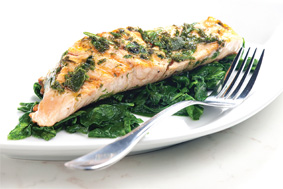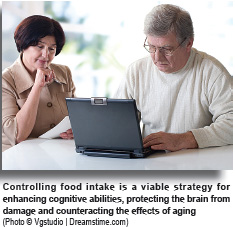
BY 2030, the youngest of the so-called baby boomers will turn 65. How they will cope with the onset of aging - and possibly caring for their elderly parents, as well - can well depend on changes in diet that they make today. Experts agree that controlling food intake is a viable strategy for enhancing cognitive abilities, protecting the brain from damage and counteracting the effects of aging. How can one relate these observations to the current situation in the region? From 2000 to 2050, according to the United Nations, the number of elderly over 60 in the Middle East is expected to rise six-fold from 21 million to 127 million. In contrast, the growth in the region's youthful population will slow down during this period, so that by 2050 the number of seniors over 60 will almost equal the number under 15 (127m vs. 143m), with the 60+ population exceeding the under 15s in 12 of the region's 20 countries. This demographic transition from the period of population growth and dominance of youthful Middle Easterners from 1950 to 2000, to a population with more elderly will now very much affect government policy, family dynamics and health programmes. Reducing the onerous and costly prospects of caring for the elderly should start now. The food industry could play a role in educating and encouraging today's middle-aged population to shift to an optimal diet to counter the effects of aging, including cognitive decline. 'Brain Food' Whilst there are still mysteries surrounding the fundamental process of memory, research has revealed activities that may enhance memory and promote overall brain health. There are certain "brain foods" that seem to have a benefit on the brain, said John H. Byrne, PhD, who studies the neuronal and molecular mechanisms underlying learning and memory at the University of Texas Health Science Centre at Houston (UTHealth) Medical School. "New research shows that Omega-3 fatty acids, such as those found in salmon and other fish, may build the brain's grey matter. Foods and beverages that are rich in antioxidants may also help keep the brain sharp. For brain food, consider a glass of red wine, some salmon, blueberries, a little bit of chocolate or a cup of green tea," said Dr Byrne, a professor and chairman of the Department of Neurobiology and Anatomy. Omega-3 especially important Scientists are also learning which omega-3 fatty acids seem to be especially important. One is docosahexaenoic acid, or DHA, which is abundant in salmon. DHA, which reduces oxidative stress and enhances synaptic plasticity and learning and memory, is the most abundant omega-3 fatty acid in cell membranes in the brain. Omega-3 fatty acids - also found in walnuts and kiwi fruit - provide many benefits, including improving learning and memory and helping to fight against such mental disorders as depression and mood disorders, schizophrenia, and dementia, according to a review of 160 studies about food's affect on the brain in Nature Reviews Neuroscience (2008). In contrast to the healthy effects of diets that are rich in omega-3 fatty acids, diets high in trans fats and saturated fats adversely affect cognition, the studies indicate. This may explain why in Okinawa, Japan, where people frequently eat fish and exercise, the lifespan is one of the world's longest, and the population has a very low rate of mental disorders, author Fernando G&oacuate;mez-Pinilla noted.

Housekeeping in the brain Eating berries may activate the brain's natural housekeeper for healthy aging, scientists said at the 240th National Meeting of the American Chemical Society (ACS), concluding that berries clean up and recycle toxic proteins linked to age-related memory loss and other mental decline. Shibu Poulose, Ph.D., who presented the report , said previous research suggested that one factor involved in agin
Air Jordan I 1 Shoes BY 2030, the youngest of the so-called baby boomers will turn 65. How they will cope with the onset of aging - and possibly caring for their elderly parents, as well - can well depend on changes in diet that they make today. Experts agree that controlling food intake is a viable strategy for enhancing cognitive abilities, protecting the brain from damage and counteracting the effects of aging. How can one relate these observations to the current situation in the region? From 2000 to 2050, according to the United Nations, the number of elderly over 60 in the Middle East is expected to rise six-fold from 21 million to 127 million. In contrast, the growth in the region's youthful population will slow down during this period, so that by 2050 the number of seniors over 60 will almost equal the number under 15 (127m vs. 143m), with the 60+ population exceeding the under 15s in 12 of the region's 20 countries. This demographic transition from the period of population growth and dominance of youthful Middle Easterners from 1950 to 2000, to a population with more elderly will now very much affect government policy, family dynamics and health programmes. Reducing the onerous and costly prospects of caring for the elderly should start now. The food industry could play a role in educating and encouraging today's middle-aged population to shift to an optimal diet to counter the effects of aging, including cognitive decline. 'Brain Food' Whilst there are still mysteries surrounding the fundamental process of memory, research has revealed activities that may enhance memory and promote overall brain health. There are certain "brain foods" that seem to have a benefit on the brain, said John H. Byrne, PhD, who studies the neuronal and molecular mechanisms underlying learning and memory at the University of Texas Health Science Centre at Houston (UTHealth) Medical School. "New research shows that Omega-3 fatty acids, such as those found in salmon and other fish, may build the brain's grey matter. Foods and beverages that are rich in antioxidants may also help keep the brain sharp. For brain food, consider a glass of red wine, some salmon, blueberries, a little bit of chocolate or a cup of green tea," said Dr Byrne, a professor and chairman of the Department of Neurobiology and Anatomy. Omega-3 especially important Scientists are also learning which omega-3 fatty acids seem to be especially important. One is docosahexaenoic acid, or DHA, which is abundant in salmon. DHA, which reduces oxidative stress and enhances synaptic plasticity and learning and memory, is the most abundant omega-3 fatty acid in cell membranes in the brain. Omega-3 fatty acids - also found in walnuts and kiwi fruit - provide many benefits, including improving learning and memory and helping to fight against such mental disorders as depression and mood disorders, schizophrenia, and dementia, according to a review of 160 studies about food's affect on the brain in Nature Reviews Neuroscience (2008). In contrast to the healthy effects of diets that are rich in omega-3 fatty acids, diets high in trans fats and saturated fats adversely affect cognition, the studies indicate. This may explain why in Okinawa, Japan, where people frequently eat fish and exercise, the lifespan is one of the world's longest, and the population has a very low rate of mental disorders, author Fernando G&oacuate;mez-Pinilla noted.
BY 2030, the youngest of the so-called baby boomers will turn 65. How they will cope with the onset of aging - and possibly caring for their elderly parents, as well - can well depend on changes in diet that they make today. Experts agree that controlling food intake is a viable strategy for enhancing cognitive abilities, protecting the brain from damage and counteracting the effects of aging. How can one relate these observations to the current situation in the region? From 2000 to 2050, according to the United Nations, the number of elderly over 60 in the Middle East is expected to rise six-fold from 21 million to 127 million. In contrast, the growth in the region's youthful population will slow down during this period, so that by 2050 the number of seniors over 60 will almost equal the number under 15 (127m vs. 143m), with the 60+ population exceeding the under 15s in 12 of the region's 20 countries. This demographic transition from the period of population growth and dominance of youthful Middle Easterners from 1950 to 2000, to a population with more elderly will now very much affect government policy, family dynamics and health programmes. Reducing the onerous and costly prospects of caring for the elderly should start now. The food industry could play a role in educating and encouraging today's middle-aged population to shift to an optimal diet to counter the effects of aging, including cognitive decline. 'Brain Food' Whilst there are still mysteries surrounding the fundamental process of memory, research has revealed activities that may enhance memory and promote overall brain health. There are certain "brain foods" that seem to have a benefit on the brain, said John H. Byrne, PhD, who studies the neuronal and molecular mechanisms underlying learning and memory at the University of Texas Health Science Centre at Houston (UTHealth) Medical School. "New research shows that Omega-3 fatty acids, such as those found in salmon and other fish, may build the brain's grey matter. Foods and beverages that are rich in antioxidants may also help keep the brain sharp. For brain food, consider a glass of red wine, some salmon, blueberries, a little bit of chocolate or a cup of green tea," said Dr Byrne, a professor and chairman of the Department of Neurobiology and Anatomy. Omega-3 especially important Scientists are also learning which omega-3 fatty acids seem to be especially important. One is docosahexaenoic acid, or DHA, which is abundant in salmon. DHA, which reduces oxidative stress and enhances synaptic plasticity and learning and memory, is the most abundant omega-3 fatty acid in cell membranes in the brain. Omega-3 fatty acids - also found in walnuts and kiwi fruit - provide many benefits, including improving learning and memory and helping to fight against such mental disorders as depression and mood disorders, schizophrenia, and dementia, according to a review of 160 studies about food's affect on the brain in Nature Reviews Neuroscience (2008). In contrast to the healthy effects of diets that are rich in omega-3 fatty acids, diets high in trans fats and saturated fats adversely affect cognition, the studies indicate. This may explain why in Okinawa, Japan, where people frequently eat fish and exercise, the lifespan is one of the world's longest, and the population has a very low rate of mental disorders, author Fernando G&oacuate;mez-Pinilla noted.  Housekeeping in the brain Eating berries may activate the brain's natural housekeeper for healthy aging, scientists said at the 240th National Meeting of the American Chemical Society (ACS), concluding that berries clean up and recycle toxic proteins linked to age-related memory loss and other mental decline. Shibu Poulose, Ph.D., who presented the report , said previous research suggested that one factor involved in aginAir Jordan I 1 Shoes
Housekeeping in the brain Eating berries may activate the brain's natural housekeeper for healthy aging, scientists said at the 240th National Meeting of the American Chemical Society (ACS), concluding that berries clean up and recycle toxic proteins linked to age-related memory loss and other mental decline. Shibu Poulose, Ph.D., who presented the report , said previous research suggested that one factor involved in aginAir Jordan I 1 Shoes
 iConnectHub
iConnectHub
 Login/Register
Login/Register Supplier Login
Supplier Login


























